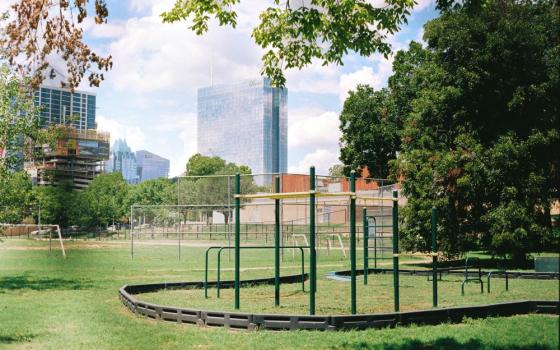The dome of St. Peter's Basilica is pictured at the Vatican July 12, 2019. (CNS photo/Paul Haring)
Pope Francis has given formal approval to a series of updates and modifications that have been made over the years to the norms regarding clerical sexual abuse and other crimes reserved to the Congregation for the Doctrine of the Faith.
The newest version of the so-called "Norms on the delicts reserved to the Congregation of the Doctrine of Faith" does not introduce any new crimes, but it does seek to improve the procedural norms regarding the penal process and to update those canons connected with the recently revised "Book VI: Penal Sanctions in the Church" that was to go into effect Dec. 8.
The document, published by the Vatican Dec. 7, changes and updates modifications St. John Paul II in 2001 and Pope Benedict XVI in 2010 made to the list of canonical delicts or crimes reserved to the Congregation for the Doctrine of the Faith and the procedures for handling such cases.
Since then, many new measures have been established: Pope Francis' document "As a loving mother" in 2016 set out procedures for removing church leaders who mishandle abuse; "You are the light of the world" in 2019 established new procedures for reporting abuse and violence, and sought to hold bishops and religious superiors more accountable; a document in 2019 abolished the pontifical secret in cases of sexual violence and the abuse of minors committed by members of the clergy; and another document in 2019 raised the age to 18 of what constitutes a minor in pornographic images.
The new version of the "Norms on the delicts reserved to the Congregation for the Doctrine of the Faith" includes all those additions.
Advertisement
The norms are now also "harmonized" with the revised section of the Code of Canon Law dealing with crimes and punishments, "Book VI: Penal Sanctions in the Church," one of seven books that make up the code for the Latin rite of the Catholic Church.
Another change concerns the penal procedure. For example, the 2010 norms said a regular canonical trial was the preferred procedure for the accused, although it foresaw the use in exceptional cases of the option of an "extrajudicial decree," an administrative process by which the accused is presented with the evidence and given an opportunity for self-defense, but there is no trial.
Now, the distinction between the two processes has been clarified; while still giving priority to the regular canonical trial, it no longer defines a trial as the "usual" procedure and an administrative process as the exception.
The updated norms allow for the possibility of referring directly to the decision of the pope with regard to dismissal from the clerical state or deposition, together with dispensation from the promise of celibacy and from religious vows, even in the most grave cases of heresy, apostasy and schism.
And to strengthen the accused's right to defense, the time limit for presenting an appeal after sentencing has been expanded from 30 to 60 days and it has established the need for a "patron" for the accused during the trial phase, according to Vatican News.







